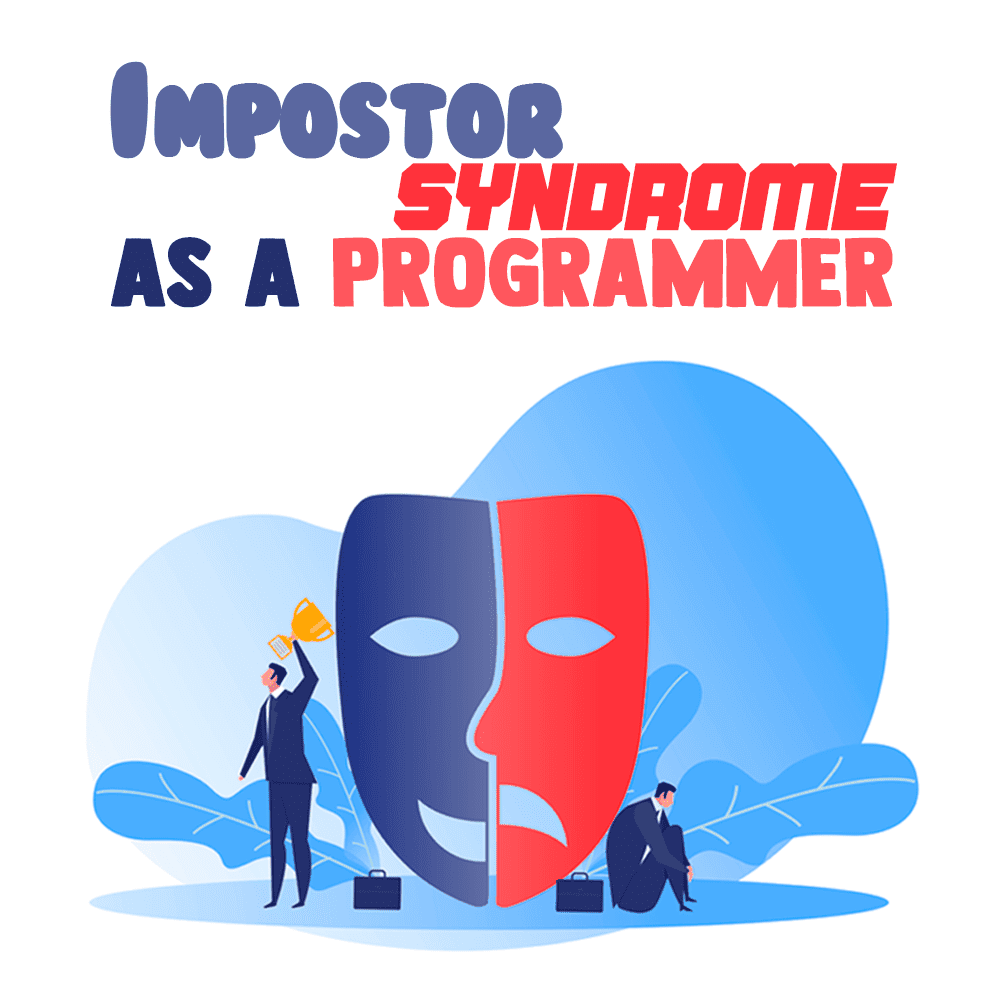 Believing that you’re somewhat unqualified for your job is a problem faced by the best of us. When those thoughts creep into your head, they’re hard to shake off.
Believing that you’re somewhat unqualified for your job is a problem faced by the best of us. When those thoughts creep into your head, they’re hard to shake off.
Having impostor syndrome makes you feel like you’re not doing enough work, not learning quickly enough, or that you’re simply not good enough for the position you’re occupying—even when you’ve worked tirelessly to get to where you are.
Impostor syndrome is characterized by feelings of inadequacy in the workplace, leading to a fear of being discovered as a fraud. It’s like having chronic self-doubt.
In this article, you’ll find out everything you need to know about impostor syndrome. How it manifests, how it impacts your career as a programmer, and how you can deal with it. I’ll also share my own experience with impostor syndrome and the steps I’ve taken to work through it.
How I Found Out I Was Dealing With Impostor Syndrome
The thought is always there. It’s that inner voice that tells you to keep quiet while the smart people are talking and that your opinion is way too unimportant to be aired. That’s how impostor syndrome creeps in.
In my case, I think I always had it. I always chose to take on the simpler tasks rather than the tougher and more challenging ones. I told myself that if I tried out a new project that was beyond my knowledge, I would fail terribly.
I didn’t know the term “imposter syndrome” but I wanted to know why I ran away from things I wanted to learn or felt slow when I tried to acquire new skills. I googled my problems and finally found a list of symptoms that matched my predicament, including:
- I felt I didn’t deserve the position I was in because I wasn’t good enough for it. Chronic self-doubt was my very close companion.
- I doubted my accomplishments and attributed them to outside help or luck.
- I fixated on my errors and failures and allowed them to dictate my intelligence limits.
- I doubted my skills when I realized I didn’t know everything there is to know.
- I believed some projects were just way out of my league and I shouldn’t even bother trying.
- When I heard from other developers about their skills and experience, I thought I could never attain their level and that they were all smarter and more talented than myself.
- I refused to communicate my ideas.
- I felt anxious and stressed due to feelings of inadequacy.
These symptoms I found were all related to impostor syndrome.
I now knew why I couldn’t learn to program when I first developed an interest in it in 2019. I started with HTML and it looked good.
This is nice, I can do this.
Then I opened JavaScript and it really hit me. The self-doubt crept in.
Who are you trying to deceive? Why would you even think for one second that you can handle this? Do you think programming is a joke and any person can just get into it? You’re terrible at math and get frustrated at the first sign of a problem, and you think programming is the next thing for you? You’re kidding yourself.
At that point, I felt like a total fraud. Like if I ever got a job in programming, it would be with fake credentials.
How Impostor Syndrome Affects Programmers Generally
If you’re relating to these symptoms I have mentioned, you probably have impostor syndrome, too.
It hinders programmers from taking on projects that are different from the types they usually take on, from speaking up and chipping in ideas at work, or from starting up their own establishments.
Oftentimes, developers will quit their jobs because they feel they’re not fit for the role. They might even switch to a whole new career thinking that they can’t keep up with working in tech.
I, for one, put off learning how to code for three years. I started a business and then eventually went into growth marketing. I finally learned how to manage my self-doubt and got back into programming, but I had lost a lot of time.
You might be thinking of quitting, too, because you don’t believe in yourself or your abilities. Maybe your self-doubt is eating you alive and you just can’t get over it.
Impostor syndrome slows down your career growth as a programmer. It reduces your productivity, and we can’t have that. You’re very important to the advancement of the tech field, and I can’t let you quit. Not without sharing my hard-earned imposter syndrome management tips first!
How I Learned to Manage My Impostor Syndrome and Get Back Into Programming

During that time, I have also gotten back into programming. I’m more dedicated to learning new languages and developing projects for when I’m finally ready to transition into programming fully and start applying for jobs.
In that time, something had to have changed. I no longer felt those inklings of self-doubt. I was more confident in my skills, and it helped me excel at my work and learn programming languages better and faster.
So, what changed?
Well, I found ways around my impostor syndrome, and now I no longer give up on a task or project just because my brain tells me it’s too big for me or that I can’t handle it. I don’t even need outside motivation to keep me going.
Here are some of the things I did that helped me let go of my self-doubt. You might want to try them out for yourself so you can get better at managing impostor syndrome.
Make a Habit of Being Uncomfortable
The first time I quit learning how to code, it was mostly because I felt uncomfortable with it. It was totally out of my comfort zone and unrelated to what I was studying. When I felt the weight of the discomfort, I decided to quit and let go of my passion. This is how self-doubt turns your dreams into wasted ambitions.
So, to get back into programming, I had to get comfortable with my discomfort. Whenever I feel like programming is way out of my league, like I’m impersonating a really smart programmer, or like I’m a wolf in sheep’s clothing, I don’t stop learning. I sit in that discomfort and soak it in.
As a programmer, you should already know what you want and have goals to get it. Discomfort shouldn’t throw you off-track and keep you away from success.
Stop Letting Professionals Intimidate You
Programmers in general like posting their work on social platforms so other people can check it out. Showing off your work is an important step in building your brand so you can get high-paying jobs.
One thing I always did was compare myself to the work of professionals. I’d look at their code and instantly get a brain freeze.
What are all these? Why don’t I understand these yet?
The thing is, these folks are professionals. They’ve been writing code for years. They developed dozens of projects that are far superior to the weather app you’re working on. If you continue to compare yourself to them, you’ll start feeling like you’re not doing enough, you’re unintelligent, or you’re not a programmer and you’re just deceiving yourself.
When you finish working on your tiny little project and you publish it, some professionals and more experienced programmers might tell you plainly that what you did is very little compared to what they’re doing or that you should not bother developing seemingly tougher projects because this one you just published is subpar.
Don’t worry about being inferior to them. You don’t have time for that. Work harder and filter out the noise, and you’ll soon find yourself doing the things they said you couldn’t handle.
Embrace the Impostor and Know You Cannot Always Be the Best
Being a programmer means there’s always something new to learn—a new language, concept, syntax, etc. I had to learn that I can’t be on top of everything at all times. To become a great programmer, I have to devote myself to learning constantly.
When you have impostor syndrome, you’ll doubt your abilities just because you don’t know how to use the hot new tool or you’re not easily grasping the language everyone is talking about. At this point, you’ll feel the full crushing weight of self-doubt and you might want to give up on everything.
However, once you accept that you cannot possibly know everything there is to know about programming, that you cannot be the best in the whole world, you can embrace feeling like an impostor and take it as an opportunity to learn something new.
The best programmers are not the ones who know everything, but the ones who are willing to learn new things whenever they’re needed.
Say Yes to Doing Things You Don’t Know How to Do Yet
I do this thing at work where I say yes to carrying out tasks I know nothing about. When I don’t know how to do something, I don’t say, “Oh I’m sorry, I don’t know what that is or how to do it so I can’t.”
I just say, “Sure.”
Immediately after that, I’ll start researching how to do that particular thing, then I’ll find out how to do it faster. Before I know it, I’m done. I’ve completed the task I knew nothing about and learned something in the process.
Successful programmers don’t say no to a new project just because they’ve never done it before or because their brain tells them they can’t do it. That’s what impostor syndrome does. It makes you stay away from anything challenging so you never leave your comfort zone. If you want to be a better programmer and stop feeling like a fraud, you have to challenge yourself and do all those things your mind says you can’t do.
Soon, those feelings of self-doubt will no longer mean anything to you because you’ve been facing your challenges head on and you will continue to do so.
Keep Track of Your Accomplishments
Accomplishments are great reminders of your abilities and worth. As you grow as a programmer, naturally you’ll start working on projects at increasingly higher levels. You can document your achievements so you can go back to look at them later and pat yourself on the back for how far you’ve come. It’s a nice reminder of your growth.
I usually set tasks for myself in the Notion app. I’ll write a description of the projects I’m working on, what I hope to learn while working on them, and the tools or languages I plan to use in completing them. When I’m through with the projects and move them to the completed projects list, they’re always there for me to look back and commend myself.
You can also document the new problems you solved (that horrifying bug that almost took your life or how you cracked some interview questions). These will help you later on to be more confident in yourself and your skills.
You’ve Got This!

Here’s a highlight of some of the things that can help you manage impostor syndrome:
- Make a habit of being uncomfortable.
- Stop letting professionals intimidate you.
- Embrace the impostor and know that you cannot always be the best.
- Say yes to things you don’t know how to do yet.
- Keep track of your accomplishments.
I have shared my experience in this article as well as some actionable steps you can take to manage your own impostor syndrome. I hope they help you wrangle this conniving beast!!
